Hindu Dharma has taught us how to perform various achars associated with cooking in an appropriate manner. Table salt is one of the most important ingredients in cooking. Though salt-less food is tasteless food, following points will explain why use of salt should be restricted. Also let us understand characteristics of different types of edible oils through this article.
1. Table salt
1 A. Add table salt just sufficient to improve the taste
By adding table salt just sufficient to improve the taste of a dish,care is taken to restrict the Raja-Tama components in them from functioning with the help of other food ingredients.
1 B. Avoid excessive consumption of table salt
Due to excessive consumption of table salt, the Raja-Tama-predominant waves remain in a congregated state in the body and form centres at respective places. Subsequently, negative energies dwell in these centres. Therefore, avoid excessive use of table salt in meals.
1 C.At night, do not exchange items such
as table salt and old curds that are used as utara
Night is considered an inauspicious period by Dharma due to Raja-Tama-predominant environment.Exchange of any Raja-Tama-predominant items during this period is prohibited; for, nights being conducive to Raja-Tama-predominant exchange, there is a strong possibility of obstruction by negative energies in every act and also of negative energies from one house entering the other through the medium of such items.Generally, an utara of salt, bhakri, buttermilk or any sour item is given for attracting the inferior level negative energies. This is called ‘white utara’. Therefore, do not perform an inauspicious act of exchanging items such as salt and old curds at night.
1 D. Do not serve salt on the palm and eat
Table salt is considered Raja-Tama-predominant. When table salt is taken on the palm, the rapidly functioning Raja component waves in it dissipate into the body and help the Tama component to congregate in the body; hence, taking table salt on the palm and eating is considered inappropriate.
2. Edible oil
Oil is Agnitattva (Absolute Fire Principle)predominant, has latent heat, sharp, sweet, bitter, nutritious, slightly astringent, clean, aphrodisiac, beautifying and softener for skin; it also strengthens the muscles and enhances energy.
| Mustard | Linseed | Safflower | Peanut | Sunflower | Coconut | Sesame | |
|---|---|---|---|---|---|---|---|
| The component from the subtle-air emitted by the oil |
Tama-Raja | Raja-Tama (When compared with safflower oil) | Raja-Tama (When compared with peanut oil) |
Raja-Tama | Raja-Sattva | Raja-Sattva | Sattva-Raja |
| The subtle-body that is affected |
Praṇadeha (Vital body) |
Praṇadeha and praṇamaya- kosha (Vital energy sheath) |
Praṇadeha and Praṇamaya-kosha |
Praṇadeha | Praṇamaya-kosha | Praṇamaya-kosha | Praṇamaya-kosha and Manomaya-kosha (Mental sheath) |
| The level of waves emitted by a lit lamp |
Gross among the gross |
Gross | Gross | Gross | Gross-subtle | Gross-subtle | Subtle-gross |
| The Deity Principle attracted to the lamp |
Subordinate Deities, likewise subordinate negative energy |
Subordinate Deities, superior negative energy |
Subordinate Deities like Asara (found at water reservoirs), subordinate type of negative energy |
Subordinate Deities |
Subordinate Deities |
Subordinate superior Deities |
Superior Deities |
| Panchatattva related to the waves emitted by the lamp |
Pruthvi(Absolute Earth Principle)+ Apa (Absolute Water Principle) |
Pruthvi + Apa |
Apa | Apa + Tej (Absolute Fire Principle) | Tej | Tej | Tej + Vayu(Absolute Air Principle) |

 Realise the power of water and make full use of it
Realise the power of water and make full use of it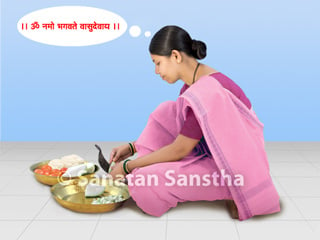 Importance of love for others and spiritual emotion for God while cooking
Importance of love for others and spiritual emotion for God while cooking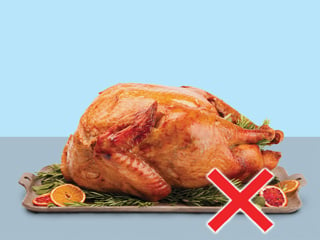 Effect of cooking non-vegetarian food
Effect of cooking non-vegetarian food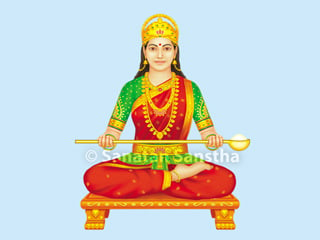 Shri Annapurnadevi
Shri Annapurnadevi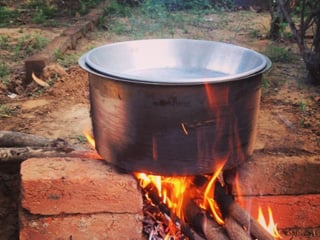 Conducts related to cooking and preparation of food
Conducts related to cooking and preparation of food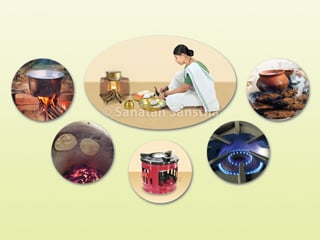 Methods of cooking, appliances, their benefits and harm
Methods of cooking, appliances, their benefits and harm